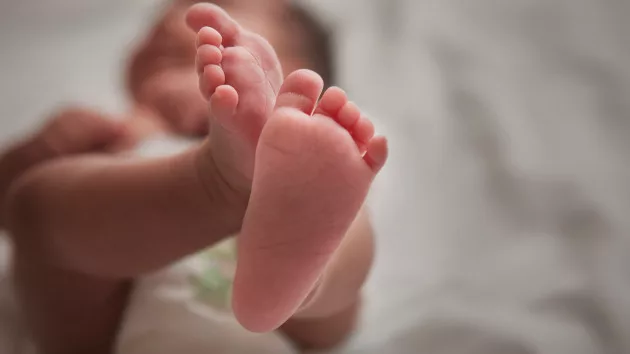
(NEW YORK) — A record number of people are expected to travel during the upcoming holiday season, starting with Thanksgiving — just as respiratory illnesses are rising around most of the United States.
Currently, kids under 5 years old are being hospitalized with respiratory illnesses at a higher rate than any other age group, according to the Centers for Disease Control and Prevention. One of the most common types of respiratory viruses that circulates this time of year is called respiratory syncytial virus, or RSV.
“RSV is a very common virus. Most children in the United States get infected by the time they’re 2 years of age,” Dr. Jeffrey Kahn, chief of infectious diseases at Children’s Health, Dallas, and professor of pediatrics at the University of Texas Southwestern Medical Center, told ABC News.
Even though exposure to RSV may be inevitable in a child’s early life, families can take steps to minimize its effects this holiday season. Experts say avoiding people who are sick, good handwashing, getting preventive shots and breastfeeding all minimize the risk of severe complications from RSV for babies.
Here’s what you need to know to help protect your child from RSV this season:
Thousands of kids a year are hospitalized with RSV
RSV is the most common cause of bronchiolitis, a breathing problem that affects young children. It’s caused by inflammation in the smallest airways of the lungs that leads to mucous buildup, making it hard for babies to breathe, according to the CDC. In severe cases, infants may need to be hospitalized for breathing support or they may not be able to eat properly, leading to dehydration. Each year, RSV is responsible for 58,000-80,000 hospitalizations and between 100 and 300 deaths in children less than 5, the CDC says.
Among all age groups, babies less than 6 months old are at the highest risk of being hospitalized with RSV, especially those under 3 months old, according to the CDC. Babies who were born prematurely, or those with underlying heart, lung or neuromuscular problems, are also at high risk.
Doctors say that people visiting babies should consider wearing a mask during or after traveling, should wash their hands before holding a baby and, if someone is sick, they should stay away while having symptoms.
New preventive RSV shots are available
“For the first time in decades, really, maybe since the virus was discovered, we have some very useful tools now to prevent RSV infection,” Kahn said.
There are three new preventative RSV products this season, giving doctors four total options against the disease. Doctors say they hope these shots can help turn the tide against severe RSV cases.
There are two protective shots available for babies, and both contain antibodies against the virus. Nirsevimab is new this season, while palivizumab has been on the market for nearly two decades.
Nirsevimab is a single seasonal shot for all babies less than 8 months old and some other high-risk kids up to 19 months old. Palivizumab is a monthly injection given in October through March to children less than 2 years old who have certain high-risk health problems and meet specific criteria.
There is currently a supply shortage of nirsevimab, so the CDC is encouraging that it only be given to babies less than 6 months old and some other high-risk kids who don’t qualify for palivizumab this season.
There are also two RSV vaccines available for adults 60 and older. Additionally, Pfizer’s RSV vaccine is also recommended for pregnant people in the third trimester to protect babies. When this shot is given at least two weeks before birth, it passes on about six months of protection to the newborn.
“If you’re an older person, or pregnant, you need to remember that vaccinating yourself could go a long way to protecting our youngest, most at risk,” Dr. Julia Arana, medical director of the hospitalists team and chief of staff at East Tennessee Children’s Hospital, told ABC News.
Breastfeeding has a protective effect against severe RSV
Breastfeeding isn’t an option for all parents, as some may choose not to breastfeed or cannot breastfeed for a variety of reasons. But for those who do, a number of research studies have shown that breastfed babies are less likely to have complications of RSV. Experts believe this may be because components in breast milk help boost a baby’s immune system for added RSV protection.
“Breastfeeding clearly decreases the baby’s chance of having to have an outpatient visit or go to the hospital or worse, go to the intensive care unit,” Dr. Paul Offit, director of the vaccine education center and pediatrician in the division of infectious diseases at Children’s Hospital of Philadelphia, told ABC News.
Some babies may still need to seek care
Despite best efforts, some babies may still need medical care.
Doctors say any baby who is struggling to breathe, has difficulty waking up, or has blue discoloration of the face or lips needs to be evaluated by a medical professional right away. Parents should also get medical help if their baby isn’t feeding well or has signs of dehydration, such as dry lips or few wet diapers, according to the CDC.
Fever in some babies can also be a medical emergency, even if they appear to be well, so parents should talk to their pediatrician about when to seek care for a fever based on an infant’s age.
While there’s no specific treatment for RSV, hospitals can support babies through the illness with things like oxygen and IV fluids.
Dr. Jade A. Cobern, M.D., M.P.H., is a pediatrician, specialized in preventive medicine, and a member of the ABC News Medical Unit.
Copyright © 2023, ABC Audio. All rights reserved.
